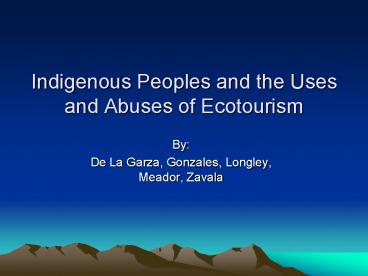Indigenous Peoples and the Uses and Abuses of Ecotourism - PowerPoint PPT Presentation
1 / 14
Title:
Indigenous Peoples and the Uses and Abuses of Ecotourism
Description:
Purposeful travel to a natural/wilderness area ... Infrastructures (hotels, roads, etc.) need to be expanded to accommodate tourists ... – PowerPoint PPT presentation
Number of Views:120
Avg rating:3.0/5.0
Title: Indigenous Peoples and the Uses and Abuses of Ecotourism
1
Indigenous Peoples and the Uses and Abuses of
Ecotourism
- By
- De La Garza, Gonzales, Longley, Meador, Zavala
2
The Scope of Tourism and Ecotourism
- 10 of the worlds gross domestic product
- Worlds largest industry and employer
- International tourism increased from 25 million
in 1950 to 425 million in 1990, a 17 fold
increase (WTO 1995) - In developing countries, tourism is especially
important, sometimes accounting for more than 50
of gross national product - Ecotourism makes up a small percentage of all
tourism, but is growing rapidly
3
Ecotourism
- Definition
- Purposeful travel to a natural/wilderness area
- To appreciate and learn from the natural and
human environments - To promoteconservation of the environment
- Substantial management of local resources
4
The Greening of Ecotourism
- Travel industry embraced green products
- Ecotourism beganto be exploited commercialized
- Became more expensive than conventional tourism
- Provided more foreign currency and employment
opportunities
5
Negative Consequences
- Although ecotourism increases revenue and
provides jobs, it has problems associated with it
- Economic issues
- Environmental issues
- Social and cultural issues
6
Economic Issues
- About 55 of receipts go to foreign companies
- More tourists means a higher cost of living, food
necessities increase, and land prices go up - Infrastructures (hotels, roads, etc.) need to be
expanded to accommodate tourists
7
Environmental Issues
- Waste water disposal, esp. in coastal areas
- Increased waste affects coral reefs, which
usually attract tourists in the first place
- Increased volume of tourists
- Trekking trips in Nepal increased from 10,000 in
1960 to 240,000 in 1987 - More roads, trash, trail erosion
8
Social Cultural Issues
- Indigenous people may be restricted from their
land, or at least the resources on it - Sometimes they continue to use resources
illegally - In Kenya, indigenouspeople were not allowedto
hunt in Tsavo NatlPark
9
Social Cultural Issues
- Differences in jobs
- Wealth disparities
- Local communities dont receive much of the
tourist income - Socioeconomic differences within indigenous
communities - Those involved w/ ecotourism vs. those who arent
10
Social Cultural Issues
- Less traditional, more modern
- Fishing boats turned into tour boats
- Locals may be seen as part of the wilderness
(like museum exhibits) - Introduction of foreign clothes, food, habits,
etc. - May be offensive to locals
11
Solutions
- Two approaches
- Modify ecotourism business practices
- Include locals in decision-making and management
12
Solutions
- Environmental organizations have developed
guidelines for businesses to follow - Use renewable resources conserve nonrenewable
resources - Travelers Code of Ethics Ten Commandments
of Ecotourism - Ecocorrect hotels
13
Solutions
- Inclusion of local people
- Who makes decisions regarding environmental
resources, locals or government? - Who is responsible for protecting resources?
- External top-down management doesnt work
- If locals arent involved in decision-making,
they wont be committed to following through on
those decisions - One solution is to give the local people a voice
in decision-making
14
Summary
- Ecotourism generates lots of money in mostly poor
places - More of that money needs to be applied towards
preservation - If the wilderness is gone, so is the tourism
- Indigenous people need to be involved in
management































